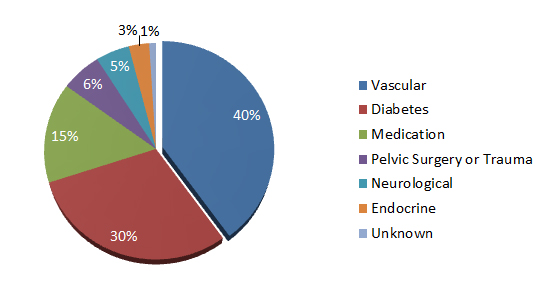How common is ED?
ED is a surprisingly common condition, about 50 % of men over the age of 40 and 10 % of men below 40 are affected by ED*.
What causes ED?
While there are real physical and psychological reasons for ED, there’s no single cause. The chart below outlines the most common causes of ED. 9
How is ED diagnosed?
You may have to start the conversation with your doctor to get an answer to the question, “Do I have ED?” A personal history and physical exam set the groundwork for most conditions. Lab tests and other tests may identify a source such as diabetes, coronary artery disease or other conditions that affect the nerves and blood flow to the penis.
If I have ED symptoms, could I have heart disease?
Hardening of the arteries caused by plaque buildup – atherosclerosis – limits blood flow to various parts of the body. The arteries supplying blood to the penis are much smaller than the ones supplying blood to the heart. As a result, heart disease may first show itself as difficulty achieving an erection. Do check with your Andrologist or General Physician for a diagnosis.36 Learn More
Why does diabetes cause ED symptoms?
Diabetes damages the blood vessels and nerves that supply the penis with blood to form an erection. The constant change in blood sugar levels can also cause nerve damage, which can lead to loss of sensation in the feet and hands, and can affect having sex.19 Learn More
What are some of the side effects from prostate cancer treatment?
The two most feared side effects of a radical prostatectomy are loss of erections and bladder leakage. These side effects can occur, but there are successful treatment options available. Also, after total removal of the prostate, there is no ejaculation, although there is the sensation of climax and orgasm. 37 Learn More
When can a man resume sexual activity after prostate cancer treatment?
If the cancer is detected early and patients are treated by an experienced surgeon using nerve-sparing techniques, then sexual activity may return to normal after surgery. This can take three to six months with continued improvement for two or three years.11 If sexual activity does not return on its own, there are many different ways to support an active sex life (medications, pumps, injections and penile implants). Learn More
How is ED treated?
ED is treatable at any age. Treating the underlying cause of ED is a good place to start, such as adjusting your lifestyle, quitting smoking and reducing your stress. Oral medications are typically the first line of therapy. Medications are typically followed by one or more of these treatments: vacuum devices, penile implants or penile injections. We recommend you discuss with your GP / Andrologist and trust him to recommend the therapy most suited to your symptoms.
DISCLAIMER: The information presented here by Boston Scientific is for educational purposes only and does not recommend self-management of health issues. The information should not be treated as comprehensive and does not intend to provide diagnosis, treatment or any medical advice. Individual symptoms, situations, circumstances and results may vary. Please consult with a registered doctor or andrologist regarding your condition and medical or health related diagnosis or treatment options.
Information on this site should not be used as a substitute for talking with your doctor. Always talk with your doctor about diagnosis and treatment information. Any decision taken based on the information provided herein is not the responsibility of the company or the website.
*Alpha One Andrology Group Study
http://timesofindia.indiatimes.com/articleshow/18992440.cms?utm_source=contentofinterest&utm_medium=text&utm_campaign=cppst
Please review the Boston Scientific Privacy Policy, for practices on the collection, storage, use and disclosure of your personal information.


